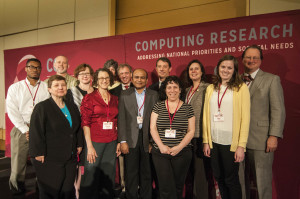
CCC Computing Research Symposium Organizers
The following is a guest blog by Greg Hager, Computing Community Consortium (CCC) Chair and Professor in the Department of Computer Science at Johns Hopkins University.
Computing has become a powerful tool for productivity and connectivity — it powers companies, it fuels scientific research, and it delivers entertainment and social engagement for billions.
Could research-based innovations in computing also become a catalyst for addressing compelling societal problems?
To explore this question, the Computing Community Consortium (CCC) organized a two-day Symposium on Computing Research: Addressing National Priorities and Societal Needs. This meeting brought together over 130 in-person participants and over 1000 online viewers to raise the visibility of work that connects innovative computing research to major societal needs. The seven panels, two plenaries, and an early career poster session, all of which are now online on the CCC website, presented numerous ideas that could (re)shape our future world. Here are just a few thought provoking examples:
- The cost of healthcare nationally is about $3T. By some estimates, a third of that total could be saved through more efficient and effective delivery of care – an amount equal to the entire contribution of the IT industry to the national GDP. There is no question computing will play a large role in achieving these savings.
- The modern urban environment is increasingly challenged by traffic congestion, aging infrastructure, and by socioeconomic disparity. Creating flexible instrumentation at a city-wide scale could provide a platform to acquire data resources that could be used to transform the management of all aspects of urban life – from improving traffic, to enhancing air quality, to reducing crime.
- World population is estimated to exceed 8B by 2025. Climate variation threatens our ability to grow food even as over 10% of world population is malnourished. Better models that increase food production efficiency by just 10% could save tens of millions of lives while sparing the environment from long-term damage.
- The population is aging, leading to both direct and intangible costs in terms of care needs, lost time, stress, and other social burdens. Could technology allow an elderly adult to live more safely and independently at home? Beyond the direct financial savings, the improvement in life quality would be immeasurable.
- Data will play a key role in all aspects of future society, but how do we provide the benefits of data while ensuring we maintain control and do not unnecessarily sacrifice privacy?
Achieving these goals requires finding ways to fund work that spans the gap between basic research and societal needs. The final symposium plenary and panel session included representatives from government, industry, and foundations, and discussed ways to expand the impact and influence of basic computing research in shaping our society.
The 133 people in attendance included 38 early career researchers who participated in a poster session and over 25 attendees from federal agencies such as National Science Foundation, National Institute of Standards of Technology, The Networking and Information Technology Research and Development (NITRD) Program, Office of Science and Technology Policy, National Institutes of Health, and U.S. Department of Agriculture.
In addition to the videos and slides of the symposium, CCC white papers on symposium topics such as Next Generation Robotics, Industry-Academia Collaborations, Smart Communities Internet of Things, and Next Generation Computing Challenges are available here.
In the end, we are only limited by our resolve and by our creativity to connect computing research to these societal challenges. We hope that you not only enjoy and learn from the symposium resources, but also find new perspectives on how your research may contribute to our collective future.










Trackbacks /
Pingbacks